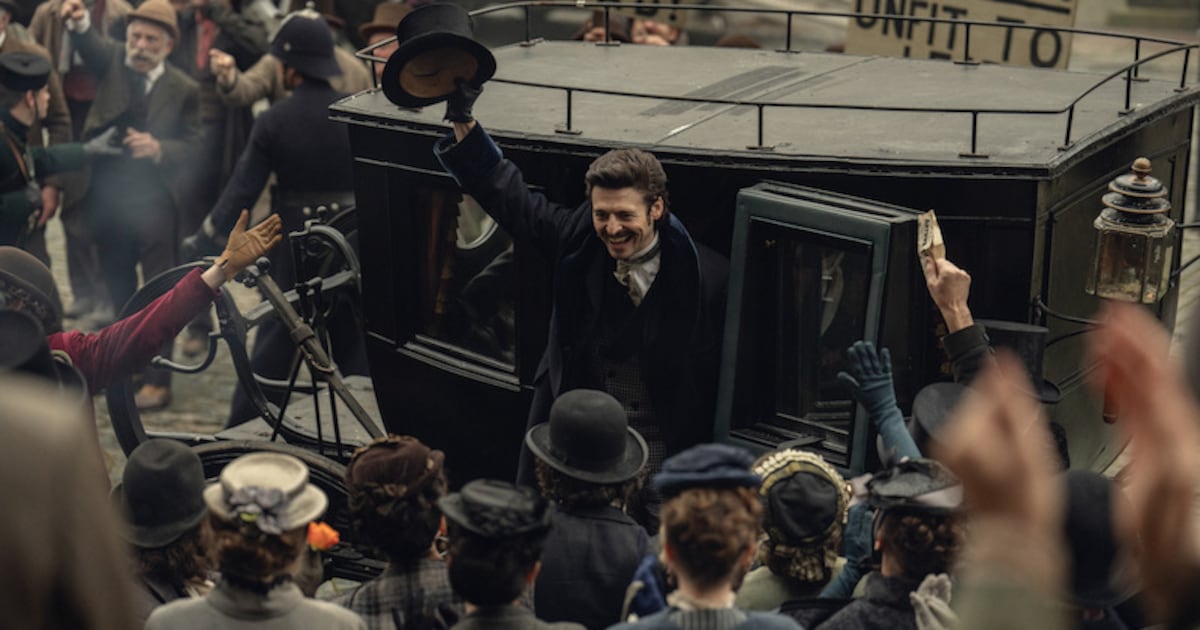Netflix has pitched House of Guinness (Netflix, from Thursday) as a sort of Succession with shillelaghs. It begins with the death in 1868 of Benjamin Guinness, grandson of the brewery’s founder, Arthur Guinness. As with the acclaimed HBO show, the story is driven by his dysfunctional children, all of whom have various designs on his beer empire.
There are many negatives, so perhaps it is best to focus on the positives up top. First of all, the music is fantastic. An early “Fenian” riot in Dublin is soundtracked by Kneecap’s Get Your Brits Out, a pairing so on the nose I could feel my nostrils climb up into my skull. Elsewhere, the score features such up and coming Irish artists as Fontaines DC, Gilla Band, Shark School, Lankum, The Scratch, Sprints, and others.
Fontaines don’t need the exposure. But how fantastic that – to pluck a random example – Gilla Band’s weapons-grade post punk is about to be beamed into livingrooms across the globe. There is also an undeniable thrill of witnessing Irish history told in epic, budget fashion.
But that’s about as good as it gets. One problem with House of Guinness is that Steven Knight’s understanding of Ireland’s experiences of colonialism is rudimentary at best (he didn’t even have to leave the UK – the series was filmed mainly in Liverpool). He pitches the struggle for independence as a battle between different kinds of Irish people. On one side are Dublin Metropolitan Police units with flint Dublin burrs, on the other, “Fenians” who dress and speak like feral leprechauns. At no point in an eight-part series unfolding in a post-Act of Union Ireland do we encounter a single person with a British accent – what Americans might call “burying the lede”.
Knight is responsible for one of the worst television shows of all time in the form of the atrocious Peaky Blinders – starring Cillian Murphy’s flat-cap and Nick Cave’s Red Right Hand and not much else (no man has ever loved anything so much as Knight does Murphy’s hat). So there are obvious concerns now that he is getting his mitts on 19th-century Irish history with House of Guinness – a wildly unfaithful retelling of the adventures of the porter-fuelled Anglo-Irish dynasty at a time when Ireland was a powder-keg primed to detonate.
He also has a stunning lack of appreciation for who the Anglo-Irish were and where they fit (or didn’t) into Irish society. To Knight, all the Irish seem much the same – the Guinness dynasty and their peers are just that little bit posher. For instance, as played by Dublin actor Danielle Galligan, Lady Olivia Hedges, daughter of the Earl of Bantry, is depicted essentially as a middle-class Cork woman.
Still, she and the rest of the cast do their best. James Norton sounds like a steampunk Mr Tayto as the Guinness’ consigliere Seán Rafferty. As the sensible one in the Guinness family, Edward, played Louis Partridge (boyfriend of Olivia Rodrigo), appears to have walked straight out of a Ross O’Carroll-Kelly spin-off. Forget the black stuff – Edward was born to chug Heinomites. There is also Anthony Boyle as the closeted head of the family, Arthur Guinness, Jack Gleeson as their illegitimate half-sibling, Byron Hughes, and Emily Bairns as Lady Anne Guinness.
In one of the more unintentionally hilarious sequences, Ms Guinness visits a village in “Connacht, Co Mayo” and is shocked to discover that a famine took place several years earlier and that everyone speaks Irish. These and other scenes left me crying out for a nice cold, creamy pint of Beamish.

